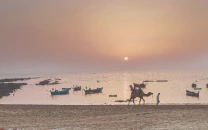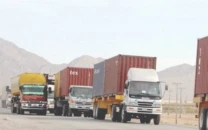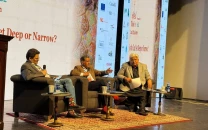Can we get rich by reducing the ‘cost of doing businesses’?
Countries can improve economic outcomes through business regulation and quality of public administration

PHOTO: REUTERS
The paper presented data on the regulation of entry of start-up firms in 85 countries covering the number of procedures, official time and official cost that a start-up must bear before it could operate legally.
The main findings of the paper were that: “Countries with heavier regulation of entry have higher corruption and larger unofficial economies, but no better quality of public or private goods. Countries with more democratic and limited governments have lighter regulation of entry.”
‘We want significant increase in trade'
The business regulation and quality of public administration is one of the main areas of structural reforms through which countries can improve their economic outcomes. Importantly, improving the “ease of doing business” is – to a large extent – accomplished through measures that imply no, or a limited, budgetary cost while they may provide significant benefits.
The Doing Business Report is a study elaborated by the World Bank Group since 2003 every year; the World Bank prepares a report on 190 economies, comparing their business regulations for domestic firms for the ease of doing business. They compare different business regulations of each country’s domestic firms to measure acceptance or complications to start and carry out small-to-medium-sized businesses.
Eleven key business protocols are considered to rank the countries. The protocols include starting a business, dealing with construction permits, getting electricity, registering property, getting credit, protecting minority investors, paying taxes, trading across borders, enforcing contracts, resolving insolvency and labour market regulations.
In its global country rankings of business efficiency, the report awarded its coveted top spot to New Zealand, followed by Singapore, Denmark, Hong Kong, South Korea, Norway, United Kingdom, United States, Sweden and Macedonia.
Pakistan has made considerable improvements in the ease of doing business over the past year, inching up four points from 148 in 2016 to 144 in 2017. Resultantly, Pakistan has been named among the top 10 economies which have improved globally in terms of business regulations according to World Bank’s Doing Business Report 2017.
Other countries, which have shown improvement on the doing business indicators include Bahrain, UAE, Georgia, Serbia, Indonesia, Belarus, Kenya, Kazakhstan and Brunei Darussalam. The inclusion of Pakistan in the top 10 reformers can be attributed to the efforts made by the government to accomplish three reforms during past year, which is the highest number of reforms completed by Pakistan in a single year over the past decade.
The reforms completed include; getting credit, registering property and trading across borders. Of the 11 aforementioned indicators, four indicators fall under the provincial domain including starting a business, dealing with construction permits, registering property and enforcing contracts, while the remaining fall under the Federal domain.
Doing Business 2017: “Equal Opportunity for All” - Main Findings
Entrepreneurs in 137 economies saw improvements in their local regulatory framework last year. Between June 2015 and June 2016, the report, which measures 190 economies worldwide, documented 283 business reforms. Reforms reducing the complexity and cost of regulatory processes in the area of starting a business were the most common in 2015-16, as in the previous year. The next most common reforms were in the areas of paying taxes, getting credit and trading across borders.
Economies in all regions are implementing reforms easing the process of doing business, but Europe and Central Asia continues to be the region with the highest share of economies implementing at least one reform — 96% of economies in the region have implemented at least one business regulatory reform.
Doing Business includes a gender dimension in four of the 11 topics sets. Starting a business, registering property and enforcing contracts present a gender dimension for the first time this year. Labour market regulation already captured gender disaggregated data in last year’s report. This year’s report expands the paying taxes topic set to cover post filing processes —what happens after a firm pays taxes — such as tax refunds, tax audits and administrative tax appeals.
Reforms in Punjab
This year, in Lahore transferring property was eased out by introduction of digitising ownership and land record in attempts to improve the quality of land administration.
Similarly, progress was made on cross-border trade in Lahore and Karachi by updating the electronic customs “Web-Based One Customs Platform”, reducing time for exporters to comply with border regulations. Moreover, the credit coverage was also expanded in Lahore and Karachi, by improving access to guaranteeing credit information.
The government of the Punjab has further devised the Jobs & Competitiveness Program in collaboration with the World Bank to support the interventions envisaged to create an enabling and conducive business environment in the province with the aim to reduce the risk and cost of doing business, facilitate employment, improve labour laws and promote investment in the province.
Government has also developed an online business registration portal to ease out the registration process in the Province alongside waiving off all sorts of business registration fee wef FY 2017-18.
To promote out of court settlements and addressing civil or commercial matters in a friendly and amiable manner by reducing the bulge of court cases and expediting the disposal of cases; establishment of the Alternate Dispute Resolution Centre has been initiated.
With the presence of all these initiatives being undertaken by the government of Punjab, future prospects for the growth of both public and private businesses seem promising in the province.
Govt created 25,000 jobs for women
Strong leadership coupled with a sound guiding policy and vision can lead Punjab to get significant improvement in indicators of the Doing Business Reforms as set by the World Bank.
Dr M Amanullah is chief economist and Myra Mufti is a research associate at the Planning and Development Department, Government of Punjab
Published in The Express Tribune, July 3rd, 2017.
Like Business on Facebook, follow @TribuneBiz on Twitter to stay informed and join in the conversation.



















COMMENTS
Comments are moderated and generally will be posted if they are on-topic and not abusive.
For more information, please see our Comments FAQ